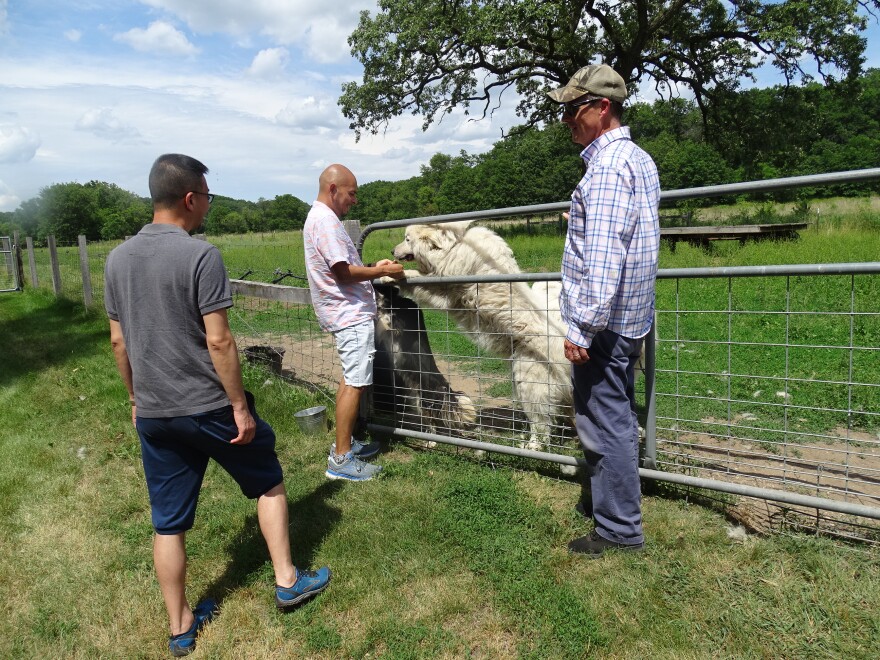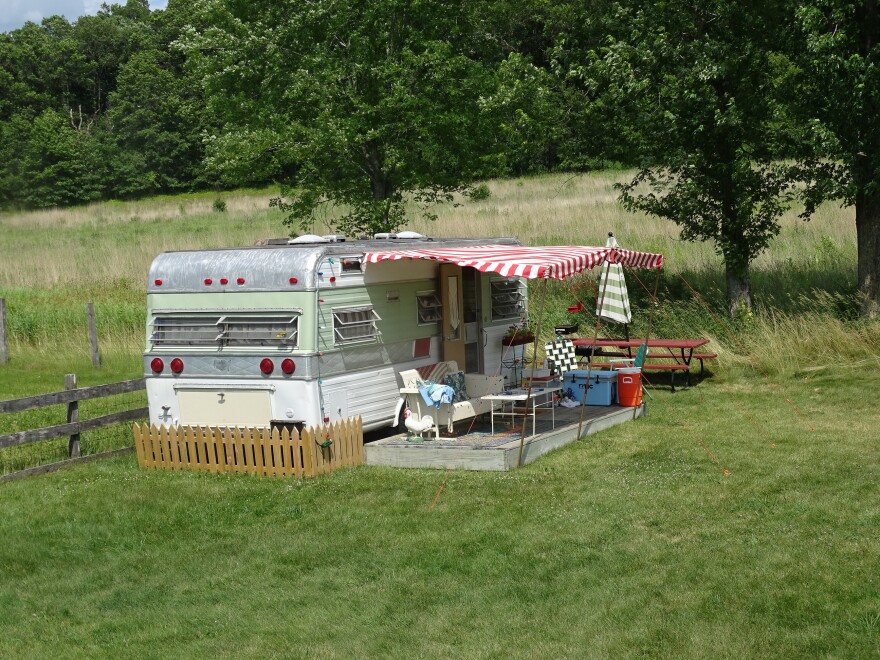Agritourism is a growing segment of Wisconsin’s economy. In fact, there’s an organization — the Wisconsin Agricultural Tourism Association — dedicated to growing the movement, in part, to help multi-generational families on the farms they cherish.
Some serve farm-to-table meals, others create corn mazes or harvest festivals to augment their income.
Kriss Marion and her husband Shannon hope to inspire others through their small business. Their 20 acres are nestled in a valley 40 minutes southwest of Madison, outside the small town of Blanchardville, Wisconsin.

“We bring over 700 people into this town a year, and the town is a population 812 or 820. That’s a tremendous boost to this little local economy," Kriss says.
Beyond the century-plus-old farmhouse stand three vintage camper trailers — each with their own desk, picnic table and awning. "One is our '50s theme, one is sort of Danish modern themed and the other midcentury," she explains.
Kriss’ husband Shannon explains the nuances of rural glamping to guests, like how to open the trailer door and not hit your head as you step inside. “Here’s an electric heater and dishes up there in the closet where there used to be a toilet," he explains.
Guests share a bathroom, can shower al fresco if they wish and enjoy their hosts' favorite feature — Shannon's sauna.

Shannon then moves on to introduce the animals: “We have three claves, we raise them for beef... We have a couple pigs, [three dogs and 40 sheep] — 20 moms and 20 lambs. Our chickens are beyond free range — you’ll find them everywhere."
This mini campground is not the Marion’s first business model. When they moved here two decades ago, Kriss says they threw themselves into growing vegetables. “We had our own CSA within two or three years of living here, 160 members, and you know, steers and sheep and hogs and chickens and ducks and goats," she says.

But when their kids grew up, and they and their friends were no longer available to help pull weeds and harvest tomatoes, the Marions opened up the second floor of their large old farmhouse as a bed-and-breakfast.
“So we were just giving it a trial run. People stayed in the bedrooms on the top floor. They all shared the top floor bathroom and then we all had breakfast around the farm table in the morning,” Kriss recall. “Sometimes we’d have like 25 people for breakfast.”
The Marions found out they are way better at the hospitality than the farm stuff, but there was a downside. When their kids came home to visit, they had nowhere to sleep. That’s where the first camper came in, and their kids loved it. “But then of course our guests were like, 'Hey, are you every going to rent that?'” Kriss says with a laugh.
So about seven years ago they tiptoed into opening the camper to guests. Kriss says it was snatched up faster than a room in their farmhouse, so the Marion’s bought a second camper, a real fixer upper. In 2018 they bought a third and final camper.
Everything shut down when Covid hit,but when the Marion’s reopened again in 2021, it was only their mini campground. Kriss says the transition came with one vexing issue – having to do with a license.

They had decided to plunk three rental trailers on the property because “it used to be in Wisconsin that three or fewer, you didn’t need a license as long as you weren’t advertising and it was kind of a word of mouth thing. And that’s why we have three,” Kriss explains.
But the rule has since changed and the Marions now need a license run their small operation. “I’m working hard with some people to change this,” she says.

The Marions are relative newbies to Wisconsin’s rural landscape. Kriss says she worries about multigenerational farmers struggling to stay on the land. “I have friends, they’re a fifth generation dairy farm and it wasn’t cutting it. So they opened up the farmhouse that wasn’t being used for a B&B,” she shares.
The B&B brought attention to her friends’ milking operation. “They started giving tours of the dairy. They talk about agriculture. They're connecting consumers to their food, which is so essential for Wisconsin, and they’ve monetized the farm again. So now the farm is paying its way,” Kriss says.
Kriss thinks Wisconsin should look for ways to encourage agritourism. “I will fight for this opportunity for our human race until the day I die,” say says.
As for the Marions, Kriss says they’ve found a business model that works. In fact, a web platform, sort of like Airbnb but focused on unique outdoorsy stays named the Marion’s the Best Hipcamp to Visit in Wisconsin in 2022.
Have an environmental question you'd like WUWM's Susan Bence to investigate? Submit below.
_






